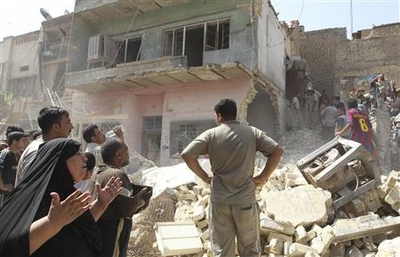
Baghdad blasts kill 28, destroy 7 buildings
Khalid al-Ansary and Waleed Ibrahim, Reuters
The upsurge in violence comes amid uncertainty over who will form the next government nearly a month after a parliamentary election that produced no clear winner. Coalition talks could take months more.

A woman reacts as residents gather near the site of a bomb attack in central Baghdad April 6, 2010. REUTERS/Mohammed Ameen
Rescuers swarmed over the debris of a collapsed three-story building in the Alawi district of central Baghdad, looking for survivors. The building had a cafe filled with patrons on the ground floor and apartments above, witnesses said.
"Suddenly we heard a big explosion and then this building collapsed. Many people are still under the debris," a man said at the scene.
A police source said the blasts had killed 28 people and wounded 93. An Interior Ministry source put the number killed at 28 and those wounded at 75.
Baghdad security spokesman Major General Qassim al-Moussawi blamed the wave of attacks since Friday on remnants of al Qaeda and supporters of ousted dictator Saddam Hussein and his outlawed Baath Party.
Moussawi put the toll at 22 dead and 134 wounded.
"We are in a battleground and we have to expect any type of attack," he said on state-run television.
WAVE OF ATTACKS
The bombings took place in the Shula and Chukook districts of northwestern Baghdad, the al-Shurta al-Rabaa area of southwestern Baghdad and the Alawi district in the center of the city, the sources said.
A suicide bomber struck near the former British embassy in central Baghdad, an Interior Ministry source said.
The explosions hit the capital two days after coordinated suicide car bomb attacks on embassies killed 41 people and wounded more than 200. The Iranian, Egyptian and German embassies appeared to be the targets.
Gunmen also attacked a village south of Baghdad and killed 24 people Friday.
Iraqi security forces had predicted a possible upturn of violence following the March 7 election, which highlighted Iraq's sectarian divide.
The top two coalitions, the cross-sectarian Iraqiya bloc of former Prime Minister Iyad Allawi and the State of Law alliance led by Shi'ite Prime Minister Nuri al-Maliki, finished just two seats apart. Neither won enough to form a majority government.
All of the major coalitions are involved in talks to form a new government.
After the last parliamentary election in 2005, sectarian violence exploded as politicians took five months to reach agreement on a government.
(Additional reporting by Aseel Kami; Writing by Ian Simpson and Jim Loney; Editing by Jon Boyle)
au.news.yahoo.com/a/-/world/7028387/baghdad-blasts-kill-28-destroy-7-buildings/
April 6, 2010
